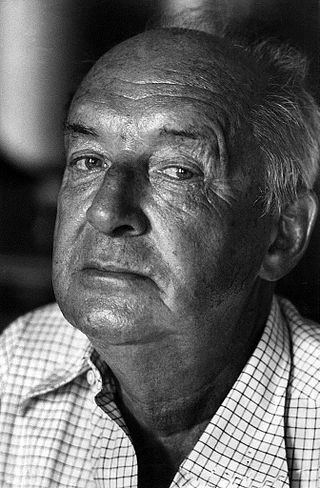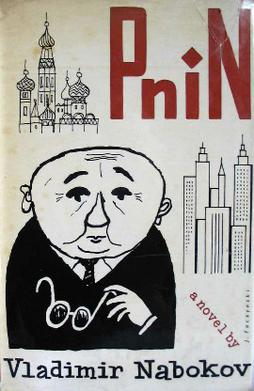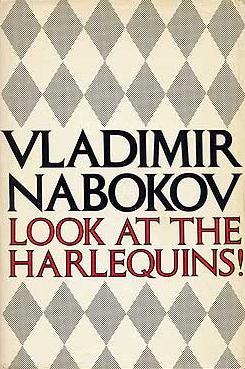Related Research Articles

Vladimir Vladimirovich Nabokov, also known by the pen name Vladimir Sirin, was a Russian-American novelist, poet, translator, and entomologist. Born in Imperial Russia in 1899, Nabokov wrote his first nine novels in Russian (1926–1938) while living in Berlin, where he met his wife. He achieved international acclaim and prominence after moving to the United States, where he began writing in English. Nabokov became an American citizen in 1945 and lived mostly on the East Coast before returning to Europe in 1961, where he settled in Montreux, Switzerland.

Pnin is Vladimir Nabokov's 13th novel and his fourth written in English; it was published in 1957. The success of Pnin in the United States launched Nabokov's career into literary prominence. Its eponymous protagonist, Timofey Pavlovich Pnin, is a Russian-born assistant professor in his 50s living in the United States, whose character is believed to be based partially on the life of both Nabokov's colleague Marc Szeftel as well as on Nabokov himself. Exiled by the Russian Revolution and what he calls the "Hitler war", Pnin teaches Russian at the fictional Waindell College, loosely inspired by Cornell University and Wellesley College—places where Nabokov himself taught.
Ada or Ardor: A Family Chronicle is a novel by Vladimir Nabokov published in 1969.
"The Vane Sisters" is a short story by Vladimir Nabokov, written in March 1951. It is famous for providing one of the most extreme examples of an unreliable narrator. It was first published in the Winter 1958 issue of The Hudson Review and then reprinted in Encounter during 1959. The story was included in Nabokov's Quartet (1966), Nabokov's Congeries, Tyrants Destroyed and Other Stories (1975), and The Stories of Vladimir Nabokov (1995).

The Gift is Vladimir Nabokov's final Russian novel, and is considered to be his farewell to the world he was leaving behind. Nabokov wrote it between 1935 and 1937 while living in Berlin, and it was published in serial form under his pen name, Vladimir Sirin.

The Original of Laura is an incomplete novel by Vladimir Nabokov, which he was writing at the time of his death in 1977. It was published by Nabokov's son Dmitri Nabokov in 2009, despite the author's request that the work be destroyed upon his death.

Novel with Cocaine is a novel first published in 1934 in a Russian émigré literary magazine Chisla (Numbers) under a pen name M. Ageyev. The English translation of the title fails to convey the double meaning of the Russian "Роман," meaning both "novel" and "romance".

Despair is the seventh novel by Vladimir Nabokov, originally published in Russian, serially in the politicized literary journal Sovremennye zapiski during 1934. It was then published as a book in 1936, and translated to English by the author in 1937. Most copies of the 1937 English edition were destroyed by German bombs during World War II; only a few copies remain. Nabokov published a second English translation in 1965; this is now the only English translation in print.
"Signs and Symbols" is a short story by Vladimir Nabokov, written in English and first published, May 15, 1948 in The New Yorker and then in Nabokov's Dozen.
The Real Life of Sebastian Knight is the first English-language novel by Vladimir Nabokov, written from late 1938 to early 1939 in Paris and first published in 1941. A work centred on language and its inability to convey any satisfactory definition, it has been identified as a forerunner of the postmodernist novel.
The Eye, written in 1930, is Vladimir Nabokov's fourth novel. It was translated into English by the author's son Dmitri Nabokov in 1965.

Look at the Harlequins! is a novel written by Vladimir Nabokov, first published in 1974. The work was Nabokov's final published novel before his death in 1977.
"Spring in Fialta" is a short story written by Vladimir Nabokov in 1936, originally as Весна в Фиальте in Russian, during his exile in Berlin. The English translation was performed by Nabokov and Peter Pertzov. Spring in Fialta is included in Nine Stories and Nabokov's Dozen.
"The Aurelian" is a short story first written in Russian as Pil'gram by Vladimir Nabokov during his exile in Berlin in 1930. After translation by Nabokov and Peter Pertzov it was published in English in The Atlantic Monthly in 1941. The Aurelian is included in Nine Stories and Nabokov's Dozen.
"Bachmann" is a short story written in Russian by Vladimir Nabokov under his pen name, Vladimir Sirin, in Berlin in 1924. The story details a three-year love affair between the titular Bachmann, a celebrated pianist, and Mme. Perov, a married woman.
"The Leonardo" is a short story written in Russian by Vladimir Nabokov in Berlin in the summer of 1933. It was first published as Korolyyok in Posledniye Novosti in Paris the same year, and in 1956 as part of the collection Vesna v Fialte. After its translation into English by the author and his son Dmitri Nabokov it was incorporated into the collection A Russian Beauty and Other Stories and published in 1971.
"Terra Incognita" is a short story written in Russian by Vladimir Nabokov that was first published in the émigré journal Posledniya Novosti in Paris in 1931. Translated by the author and his son, the story was published in English in The New Yorker in May, 1963, and later added to A Russian Beauty and Other Stories.

Lolita is a 1955 novel written by Russian-American novelist Vladimir Nabokov that addresses the controversial subject of hebephilia. The protagonist is a French literature professor who moves to New England and writes under the pseudonym Humbert Humbert. He describes his obsession with a 12-year-old "nymphet", Dolores Haze, whom he kidnaps and sexually abuses after becoming her stepfather. Privately, he calls her "Lolita", the Spanish diminutive for Dolores. The novel was originally written in English, but fear of censorship in the U.S. and Britain led to it being first published in Paris, France, in 1955 by Olympia Press.
"Sounds" is a short story by Russian American author Vladimir Nabokov originally written in Russian in September 1923.
"That in Aleppo Once..." is a short story written by Russian-born author Vladimir Nabokov (1899–1977). First published in Atlantic Monthly in 1943, the story takes epistolary form, with an unnamed narrator describing his recollections of himself and his wife's deteriorating relationship while fleeing German occupation during Case Anton. The narrator reveals to his correspondent the likelihood his wife was not real, examining this premise during the account of events.
References
- ↑ Nabokov, Vladimir (2008). The Stories of Vladimir Nabokov. Vintage Books. p. 3-5.